University of Miami
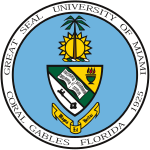 | |
| Motto | Magna est veritas (Latin) |
|---|---|
Motto in English | "Great is the truth" |
| Type | Private research university |
| Established | April 8, 1925 |
| Accreditation | SACSCOC and 24 others[1] |
Academic affiliations | |
| Endowment | $1.37 billion (2023)[3] |
| Budget | $5.2 billion (2024)[4] |
| President | Joe Echevarria |
| Provost | Guillermo Prado |
Academic staff | 3,513 (fall 2023)[4] |
Administrative staff | 15,491 (fall 2023)[4] |
| Students | 19,593 (fall 2023)[4] |
| Undergraduates | 12,570 (fall 2023)[4] |
| Postgraduates | 6,710 (fall 2023)[4] |
| Location | , Florida , United States 25°43′18″N 80°16′45″W / 25.7216°N 80.2793°W |
| Campus | Small city[6], 453 acres (1.83 km2) (total)[5] |
| Newspaper | The Miami Hurricane |
| Colors | Orange, white and green[7] |
| Nickname | Hurricanes |
Sporting affiliations | |
| Mascot | Sebastian the Ibis |
| Website | miami |
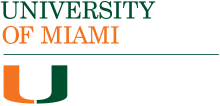 | |
The University of Miami (UM, UMiami, Miami, U of M, and The U[8][9]) is a private research university in Coral Gables, Florida, United States. As of 2023[update], the university enrolled 19,593 students[4] in two colleges and eight schools across nearly 350 academic majors and programs, including the Miller School of Medicine in Miami's Health District, the law school on the main campus, the Rosenstiel School of Marine, Atmospheric, and Earth Science on Virginia Key, and additional research facilities in southern Miami-Dade County.[10]
The University of Miami offers 148 undergraduate, 148 master's, and 67 doctoral degree programs.[4][11] With over 16,000 faculty and staff as of 2024, the University of Miami is the second-largest employer in Miami-Dade County.[12] The university's main campus in Coral Gables spans 240 acres (0.97 km2), has over 5,700,000 square feet (530,000 m2) of buildings, and is located 7 miles (11 km) southwest of Downtown Miami, the heart of the nation's ninth-largest and world's 65th-largest metropolitan area. As of 2023, it is the 75th-largest research university in the nation with annual research expenditures of $456 million.[4]
As of 2023,[update] the University of Miami has 229,710 alumni from all 50 states and 174 foreign nations.[13] University of Miami faculty include a number of notable academics across nearly all disciplines, including four Nobel Prize recipients. The university is classified among "R1: Doctoral Universities – Very high research activity" and is a member of the Association of American Universities.[14][15]
The University of Miami's intercollegiate athletic teams are collectively known as the Miami Hurricanes and compete in Division I of the National Collegiate Athletic Association.[16] Its football team has won five national championships since 1983,[17] and its baseball team has won four national championships since 1982.[18]
History
[edit]
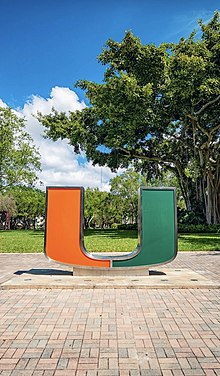


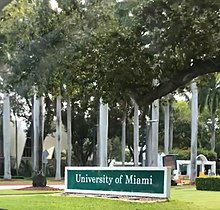
Leadership
[edit]Bowman Foster Ashe (1926 to 1952)
[edit]In 1925, the University of Miami was founded by a group of citizens who sought to offer "unique opportunities to develop inter-American studies, further creative work in the arts and letters, and conduct teaching and research programs in tropical studies", according to the university's founding charter.[21] They believed that a local university would benefit the Miami metropolitan area and were optimistic that the university would be a beneficiary of future financial support, especially since South Florida was benefiting from the historic 1920s land boom.[21] During this era of Jim Crow laws, there were three large state-funded universities in Florida for white male students, white female students, and black students: the University of Florida in Gainesville and Florida State University and Florida A&M University, both in Tallahassee. Like most private universities of the time, the University of Miami was founded as a coeducational institution but not yet open to Black students.
In 1925, George E. Merrick, founder of Coral Gables, granted 160 acres (0.6 km2) and nearly $5,000,000[22] ($86.9 million, adjusted for current inflation) for the university's founding.[23] The contributions included land contracts and mortgages on real estate that had been sold in the city.[24] The university was formally chartered April 8, 1925[25] by the Circuit Court for Dade County.[26] But by 1926, as the first class of 372 students enrolled at the new university,[27] the land boom had collapsed and hopes for a speedy recovery were dashed by the Great Miami Hurricane of 1926.[28] For the next 15 years, the university struggled financially, bordering on insolvency. The first building on campus, now known as the Merrick Building, was left half built for over two decades due to the economic difficulties,[28] requiring that classes be held off-campus at the nearby Anastasia Hotel in Coral Gables. Partitions separated the classrooms, giving the university the early but long since discarded nickname Cardboard College.[28][29][30]
In 1929, University of Miami founding member William E. Walsh and other members of the university's board of regents resigned following the widespread collapse of Florida's economy. The university's plight was so severe that students went door to door in Coral Gables collecting funds to keep it open.[29] A reconstituted ten-member board chaired by the university's first president Bowman Foster Ashe included Merrick, David Fairchild, James Cash Penney, and others. In 1930, several faculty members and more than 60 students entered the University of Miami when the University of Havana closed amidst political unrest in Cuba.[28] While helpful to the University of Miami's early development, it still was not enough, and the university was forced to seek bankruptcy protection two years later, in 1932.[28][31]
The troubles, however, were short-lived. In July 1934, the University of Miami was reincorporated and a board of trustees was installed, replacing the board of regents. By 1940, community leaders were replacing faculty and administration as trustees.[26] During Ashe's presidency, the university grew considerably, adding the School of Law (1928),[32] the School of Business (1929, renamed the Miami Herbert Business School in 2019), the School of Education (1929), the Graduate School (1941), the Marine Laboratory (1943, renamed the Rosenstiel School of Marine, Atmospheric, and Earth Science in 2022), the School of Engineering (1947), and the School of Medicine (1952).[28]
During World War II, the University of Miami was one of only 131 colleges and universities nationally to participate in the V-12 Navy College Training Program, which offered students a path to commissioning as a U.S. Navy officer.[33]
Jay F. W. Pearson (1952 until 1962)
[edit]In 1952, Jay F. W. Pearson, one of Ashe's long-time assistants, was appointed the University of Miami's second president.[34] A charter faculty member and marine biologist,[34] Pearson held the university's presidency for a decade, until 1962.[21] Under Pearson's leadership, the University of Miami began awarding its first Ph.D. degrees, and student enrollment increased substantially, exceeding 4,000.[21][35]
From 1961 until 1968, the university leased buildings on its south campus to the Central Intelligence Agency that were used in JMWAVE, a covert operation and intelligence gathering operation against Fidel Castro's communist government in Cuba.[36] The university no longer owns land at the south campus.
In 1961, the university dropped its policy of racial segregation and began admitting Black students and allowing their full participation in student activities and athletic teams.[35][37][38] Five years later, in 1966, Ray Bellamy, a Black student at the University of Miami, became the first major Black college athlete in the Deep South to receive an athletic scholarship.[39]
Until the early 1970s, as was widespread practice at colleges and universities nationally, the university regulated female student conduct more strictly than that of male students, including employing a staff under the Dean of Women charged with watching over female students. Under Pearson, however, the university began incrementally liberalizing these policies. In 1971, he consolidated the separate Dean of Men and Dean of Women positions in one.[40] The same year, the university established a Women's Commission, which issued a 1974 report on the status of women on campus,[41] leading to the university's first female commencement speaker,[42] day care, and the launch of a Women's Study minor. Following enactment of Title IX in 1972 and over a decade of litigation, University of Miami organizations, including honorary societies, were opened to women's participation and inclusion. The Women's Commission also secured more equitable funding for women's sports.[43] In 1973, Terry Williams Munz became the first woman in the nation awarded an athletic scholarship when she accepted a University of Miami golf scholarship.[44]
Henry King Stanford (1962 until 1981)
[edit]Henry King Stanford, then president of Birmingham–Southern College, was appointed the University of Miami's third president in 1962.[45] Stanford led an increased emphasis on the university's research, reorganization of its administrative structure, and construction of new campus facilities. New research centers established under Stanford included the Center for Advanced International Studies (1964), the Institute of Molecular and Cellular Evolution (1964), the Center for Theoretical Studies (1965), and the Institute for the Study of Aging (1975). In 1965, the University of Miami also began actively recruiting international students.[28] Beginning with the 1968 football season, Stanford barred playing of "Dixie" by the university's band.[28]
Edward T. Foote II (1981 until 2000)
[edit]In 1981, Edward T. Foote II, then dean of Washington University School of Law, was appointed the University of Miami's fourth president.[46] Under Foote's leadership, the university focused on attracting high-quality faculty and students, and consciously limited or reduced undergraduate admissions as part of its strategic plan. Foote also oversaw the conversion of on-campus student housing into residential colleges[47] and the university launch of its largest fundraising campaign to date, a five-year, $400 million campaign that began in 1984 and exceeded that goal, raising $517.5 million. Foote established three new schools: the School of Architecture, the School of Communication, and the School of International Studies.[48]
During Foote's tenure, the university's endowment increased nearly ten-fold, growing from $47.4 million in 1981 to $465.2 million in 2000.[49]
Donna Shalala (2000 until 2015)
[edit]In November 2000, Foote was succeeded by Donna Shalala, former chancellor of the University of Wisconsin–Madison from 1988 to 1993 and U.S. Secretary of Health and Human Services from 1993 to 2001, who was appointed the University of Miami's fifth president.[50] Under Shalala, the University of Miami built new libraries, dormitories, symphony rehearsal halls, and classroom buildings. The university's academic quality continued improving, a trend that began in earnest under Foote.[51]
Roughly a year into Shalala's presidency, on November 5, 2001, an 18-year-old University of Miami fraternity pledge drowned while attempting to swim across Lake Osceola, the campus lake, while intoxicated. Police reports later cited the student's dangerously high blood alcohol content in conjunction with dropping water temperatures and exhaustion as primary factors in his death, and two fraternity members who accompanied him were criminally charged with "negligence, breach of fiduciary duty, and breach of duty to aid and/or rescue."[52][53] The university responded by making swimming in Lake Osceola, which was already prohibited, punishable by expulsion.
In 2002,[54] the University of Miami launched a new and even more ambitious multi-year fundraising campaign that ultimately raised $1.37 billion,[55] the most ever raised by any university or college in Florida history as of 2008.[56] From these proceeds, over half, $854 million, was allocated to construct and improve the University of Miami's Leonard M. School of Medicine medical campus.[55] In November 2007, the University of Miami acquired Cedars Medical Center in Miami's Health District, renaming it University of Miami Hospital and giving the Miller School of Medicine its first dedicated in-house teaching hospital rather than having to rely on academic affiliations with area hospitals.[57]
In 2003, Shalala controversially chose to close the University of Miami's North-South Center, a university research organization dedicated to the study of contemporary issues in Latin America and the Caribbean. The North-South Center was established by the U.S. Congress in 1984. It had secured a partnership with the Rand Corporation and was, as the Associated Press reported in 2003, "a respected public policy think tank specializing in Latin American and Caribbean issues including trade and economic policy, migration, security, public corruption, and the environment."[58]
On September 30, 2004, the University of Miami hosted one of three nationally televised U.S. presidential debates between presidential candidates George W. Bush and John Kerry during the 2004 presidential election. The debate, moderated by Jim Lehrer of PBS NewsHour, was held on the University of Miami campus inside the Watsco Center. It drew 62.5 million viewers.[59]
In February 2006, University of Miami custodial workers, who were contracted to the university through a Boston-based company, alleged unfair labor practices, substandard pay, lack of health benefits, and workplace safety concerns. They launched a strike that drew support from several University of Miami students, who began a hunger strike and on-campus vigil in support of it. The strike settled May 1, 2006 when a card count union vote was permitted and led to establishment of the first collective bargaining unit in the university's history.[60][61][62] The university raised wages for its custodial workers from $6.40 to $8.35 per hour and provided health insurance.[63]
In 2008 and 2009, partly stemming from the Great Recession, the university endowment experienced a loss of 26.8% of its capital and additional associated losses from diminished endowment income. The university responded by tightening expenditures.[64][65] Damage from the endowment's negative performance was limited, however, because the university receives over 98 percent of its operating budget from non-endowment sources.[64] In 2011, the university was ranked the nation's most fiscally responsible nonprofit organization in a Charity Navigator report published in collaboration with Worth magazine.[66]
Julio Frenk (2015 until 2024)
[edit]On April 13, 2015, the University of Miami announced the appointment of Julio Frenk, former dean of Harvard University School of Public Health and former Secretary of Health for the government of Mexico, as the university's sixth president.[67] On March 10, 2016, the University of Miami hosted the 2016 Republican presidential primary's twelfth and final debate at BankUnited Center on the university campus, which aired nationally on CNN and drew 11.9 million viewers.[68]
On June 12, 2024, the University of California, Los Angeles announced that Frenk would be joining UCLA as the university's chancellor on January 1, 2025.[69] The same day, the University of Miami announced that the university's chief executive officer, Joe Echevarria, had been appointed acting president of the University of Miami "effective immediately."[70] On June 19, 2023, the University of Miami student newspaper, The Miami Hurricane, labeled Frenk's departure "shocking", and criticized his leadership. "Frenk was rarely a prominent influence on UM’s campus," the student newspaper reported.[71]
Under Frenk's nine years of leadership of the University of Miami, the university slipped notably on U.S. News & World Report's ranking of national universities, which ranked the university 48th in the nation upon his arrival in 2015[72] and 67th in the nation upon his departure in 2024.[73]
Campus
[edit]Coral Gables campus
[edit]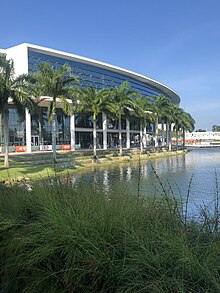

The University of Miami's main campus spans 240 acres (0.97 km2)[74] in Coral Gables, 7 miles (11 km) southwest of Downtown Miami. Most of the university's academic programs are based on its main Coral Gables campus, which houses eight schools and two colleges, including the Frost School of Music, Herbert Business School, and the University of Miami School of Law. The campus has over 5,900,000 sq ft (550,000 m2) of building space valued in excess of $657 million.[75] Lake Osceola, a man-made freshwater lake developed in the late 1940s, is located at the center of campus.
The university's campus theater, Jerry Herman Ring Theatre, is named for University of Miami alumnus Jerry Herman, a composer and lyricist responsible for some of Broadway's most successful productions, including Hello Dolly!, La Cage aux Folles, and other Broadway hits.[76]
The John C. Gifford Arboretum, a campus arboretum and botanical garden, is located on the northwest corner of the main Coral Gables campus.[77] The Jorge M. Perez Architecture Center at the University of Miami's School of Architecture holds periodic architecture and design exhibitions.[78][79]
Transportation to the Coral Gables campus is provided by Miami Metrorail, whose University Station stop is within walking distance of the campus.[80] The Metro connects the University of Miami to Downtown Miami, Brickell, Coconut Grove, Civic Center, Miami International Airport, and other Miami neighborhoods. The University of Miami's Coral Gables campus is about a 15-minute train ride from Downtown and Brickell.[81] The Hurry 'Canes shuttle bus service operates two routes on campus, including to University Station, and weekend routes to various off-campus stores and facilities during the academic year; an additional shuttle route provides service to the Rosenstiel School of Marine, Atmospheric, and Earth Science campus on Virginia Key and Vizcaya Station. The university also has a Zipcar service.
In February 2018, rap artist Drake filmed substantial portions of the music video for his song "God's Plan" on the University of Miami campus.[82][83]
Student housing
[edit]| UM residence halls[84] | Year built | Room capacity |
|---|---|---|
| Eaton Residential College | 1954 | 400 |
| Mahoney Residential College | 1958 | 700 |
| Pearson Residential College | 1962 | 700 |
| University Village | 2006 | 800 |
| Lakeside Village | 2020 | 1,115 |
| Centennial Village | 2024 | 875 (1,150 more coming in fall 2026) |
| Total | 4,590 | |
The University of Miami's main campus in Coral Gables houses 4,590 enrolled students, 89 percent of whom are freshman.[85] The university's on-campus housing consists of five residential colleges and one apartment-style housing area available only to undergraduate degree-seeking students. The residential colleges are divided into two dormitory-style residence halls and three suite-style residence halls: The first, McDonald and Pentland Towers of Hecht Residential College[86] (demolished in 2022) and the Walsh and Rosborough Towers of Stanford Residential College,[87] (demolished in 2024) are commonly referred to as the "Freshman Towers". The removal of these two dorms makes way for Centennial Village, which opened its first phase to students in the fall of 2024. Phase 2 is set to open in the fall of 2026. The second, Eaton Residential College, which originally housed only women,[88] and Mahoney/Pearson Residential Colleges[89][90] have suite-style housing with double-occupancy rooms connected by a shared bathroom.
In addition to these five residential colleges, the university campus includes a student residential area called University Village,[91] which consists of seven buildings with apartment-style annual contract housing including fully furnished kitchen facilities. University Village is available only to juniors and seniors; until 2009, it had also been open to graduate and School of Law students.[92][93]
The University of Miami has seven fraternity houses on San Amaro Drive. Sororities are housed in on-campus suites, not residences.
Lakeside Village, a residential complex of 25 interconnected buildings, provides student housing for 1,115 sophomores, juniors, and seniors.[94]
Medical school campus
[edit]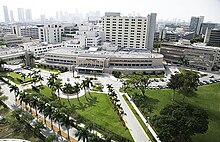
The University of Miami's Miller School of Medicine campus, located on Northwest 10th Avenue in Miami's Health District, has 1,523 full-time faculty and 819 students as of 2022.[96] The campus includes 70 acres (280,000 m2) within the University of Miami Jackson Memorial Medical Center's 153 acres (620,000 m2) complex.
The medical center includes three University of Miami-owned hospitals: University of Miami Hospital, Sylvester Comprehensive Cancer Center, and Anne Bates Leach Eye Hospital. Jackson Memorial Hospital, Holtz Children's Hospital, and Miami Veterans Affairs Medical Center are based on the medical center and maintain affiliations with the University of Miami but are not owned by the university.[97] The heart of the School of Medicine campus, the original City of Miami Hospital that opened in 1918, is known colloquially as "The Alamo", and has been named to the National Register of Historic Places.[96][98]
In 2006, the University of Miami opened a 300,000 sq ft (28,000 m2), 15-story Clinical Research Building and Wellness Center.[96] In 2007, the university purchased Cedars Medical Center and renamed it University of Miami Hospital. Situated in Miami's Health District, the hospital is close to Jackson Memorial Hospital, which is used by University of Miami medical students and faculty to provide patient care.[99]
In 2009, a LEED-certified nine-story biomedical research building, a 182,000 sq ft (16,900 m2) laboratory, and an office facility were opened to house the University of Miami's Interdisciplinary Stem Cell Institute and its John P. Hussman Institute for Human Genomics.[100] The University of Miami has completed a 2,000,000 sq ft (190,000 m2) Life Science Park adjacent to the university's medical campus that houses medical offices and laboratories.[101][102] The University of Miami's medical campus is connected to the university's main campus by the Metrorail with direct stations at University Station for the main Coral Gables campus and Civic Center Station for the medical campus.
Rosenstiel School of Marine and Atmospheric Science campus
[edit]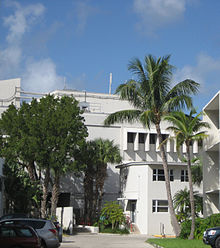
The University of Miami's Rosenstiel School of Marine, Atmospheric, and Earth Science maintains its 18 acres (73,000 m2) campus on the Biscayne Bay waterfront on Virginia Key. It is the only subtropical marine and atmospheric research institute in the continental United States. The school is home to the world's largest hurricane simulation tank.[103][104] The Atlantic Oceanographic and Meteorological Laboratory, a federal research laboratory, maintains its headquarters next to the Rosenstiel School campus on Rickenbacker Causeway and collaborates on various academic projects with the Rosenstiel School.
The school maintains the Barbados Atmospheric Chemistry Observatory (BACO), a research facility on the eastern end of Barbados in the Caribbean. The facility researches the summertime transport of dust particles from the Sahara in North Africa across the Atlantic Ocean to the Caribbean Basin and South America.[105]
The school's origins date back to 1945 when construction began on Rickenbacker Causeway to make Virginia Key accessible by car. During the Causeway's construction, Miami-Dade County offered the university a part of the island adjacent to Miami Seaquarium in exchange for it agreeing to assume operational management of the aquarium.[106] In 1951, however, the aquarium's construction was delayed following the failure of a bond referendum designed to fund it, and the university instead chose to begin leasing the land from the county. In 1953, the university built classroom and lab buildings on a 16-acre (6.5 ha) campus to house what would become the University of Miami's Rosenstiel School of Marine and Atmospheric Science (RSMAS). Additional buildings were added in 1957, 1959, and 1965.[106]
From 1947 to 1959, the State of Florida funded the University of Miami Marine Lab on Virginia Key until the state completed construction of its own marine laboratory in St. Petersburg.[106]
Since 1951, the school has published the Bulletin of Marine Science, a peer-reviewed scientific journal on ecology, fisheries management, geology, geophysics, marine biology, oceanography, meteorology, and related topics.
In 2009, the University of Miami received a $15 million federal grant to help construct a 56,500 square feet (5,250 m2) Marine Technology and Life Sciences Seawater Research Building on the Rosenstiel School campus.[107]
South and Richmond campuses
[edit]In 1946, following the U.S. military's deactivation of Richmond Naval Air Station in southwestern Miami, the University of Miami acquired the 12 mi (19 km) facility to accommodate its vast increase in post-World War II students. The property included classrooms, housing, and other amenities capable of accommodating approximately 1,100 students. Two years later, in 1948, the property was repurposed by the University of Miami as a research facility.[108] In the 1960s, the university opted to lease some of its buildings to the Central Intelligence Agency. Another section of the property, established in 1948, was called South Campus and included a 350 acres (1,400,000 m2) plot used for university-sponsored agricultural and horticultural research.[27][108] For 20 years, the University of Miami used radioactive isotopes in biological research on the South Campus and buried these radioactive materials, including animals eradicated in research, on the site. In August 2006, the University of Miami agreed to reimburse the U.S. Army Corps of Engineers $393,473 for clean up costs at the site made available under the 1980 Superfund law.[109] Six buildings on the site provide 63,800 sq ft (5,930 m2)[97] and currently house the Global Public Health Research Group, Miami Institute for Human Genomics, and Forensic Toxicology Laboratory.[110] The University of Miami once considered building a south campus on the property but instead opted in 2014 to sell the 80 acres of land.[111]
The Richmond campus is a 76 acres (310,000 m2) site that was formerly the United States Naval Observatory Secondary National Time Standard Facility, which already had buildings and a 20M antenna used for long interferometry.[112] The University of Miami's Rosenstiel School's Center for Southeastern Tropical Advanced Remote Sensing and Richmond Satellite Operations Center (RSOC) maintain their research facilities on part of this campus.
Libraries
[edit]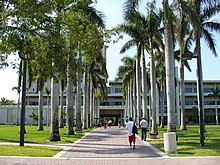
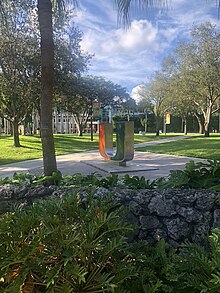
The University of Miami maintains one of the nation's largest university library systems, which currently hold in excess of four million volumes, over four million microforms, over 1.5 million electronic books, 153,648 active serials titles, 151,258 electronic journals, and 214,487 audio, film, video, and cartographic materials as of 2023.[85] The University of Miami's libraries have a staff of 71 librarians, 33 professional staff, and 76 support staff.[113][114]
Four of the University of Miami's libraries are located on the Coral Gables campus: Otto G. Richter Library, the university's primary interdisciplinary library, the Architecture Research Center at the School of Architecture, the Judi Prokop Newman Information Resource Center at the Herbert Business School, and the Marta and Austin Weeks Library at Frost School of Music.
The Miller School of Medicine's main library, Louis Calder Memorial Library, is located on Northwest 10th Avenue on the medical campus in the Miami Health District. The medical school also maintains and manages two specialized medical libraries: The Mary and Edward Norton Library in ophthalmology focused on ophthalmology and the Pomerance Library focused on psychiatry. The Rosenstiel School of Marine and Atmospheric Science Library is based on the Rosentiel School's campus on Virginia Key.[115]
Otto G. Richter Library, the largest of the university's libraries on the Coral Gables campus, houses art, architecture, humanities, social sciences, and science collections. The Richter Library also serves as a depository for federal and state government publications.[116] Rare books, maps, manuscript collections, and the University of Miami Archives are housed in the library's Special Collections Division. The Richter's Cuban Heritage Collection, which specializes in Cuba-related collections, maintains the world's largest Cuba-related holdings outside of Cuba.[117]
In January 2017, the Jay I. Kislak Foundation announced it was making a substantial donation of rare books, maps, and manuscripts to the university's libraries. In preparation for the extensive donation, the University of Miami renovated a former lecture hall, now called the Kislak Center at the University of Miami, to house the works and the university's existing special collections and archives. Among the vast holdings in the university's Kislak Center are Christopher Columbus' original published copies of his letter on the first voyage aboard the Niña, which Columbus authored on February 15, 1493.[118]
Academics
[edit]The University of Miami currently employs 2,850 full-time faculty members with 99 percent of them holding either doctorates or terminal degrees in their respective specialties.[4] The university's student-faculty ratio, as of 2018, was 12:1.[119]
Accreditations
[edit]The University of Miami is a broadly accredited academic institution, including by the Southern Association of Colleges and Schools and the Florida Department of Education and 22 additional programmatic accrediting bodies, including Accreditation Council for Graduate Medical Education, American Bar Association, American Dental Association Commission on Dental Accreditation, American Physical Therapy Association Commission on Accreditation in Physical Therapy Education, American Psychological Association, Association of MBAs (AMBA), Association to Advance Collegiate Schools of Business (ACSB International), Commission on Accreditation of Healthcare Management Education, Commission on Collegiate Nursing Education, Council on Education for Public Health, EQUIS, Liaison Committee on Medical Education, National Association of Schools of Music, and Society for Simulation in Healthcare.
The university is a member of American Association of Colleges and Universities, American Association of University Women, American Council of Learned Societies, American Council on Education, Florida Association of Colleges and Universities, Independent Colleges and Universities of Florida, and National Association of Independent Colleges and Universities.[120]
In September 2022, Miami Herbert Business School was awarded AMBA accreditation, securing triple crown accreditation status, which includes accreditation by each of the nation's three business-oriented academic accrediting bodies: ACSB International, AMBA, and EQUIS. Less than one percent of the world's business schools have been recognized with accreditation from all three of these academic accrediting bodies.[121]
Undergraduate admissions
[edit]| 2023[122] | 2022[123] | 2021[124] | 2020[125] | 2019[126] | 2018[127] | |
|---|---|---|---|---|---|---|
| Applicants | 48,286 | 49,167 | 42,244 | 40,131 | 38,919 | 34,279 |
| Admits | 8,940 | 9,311 | 12,036 | 13,280 | 10,557 | 11,020 |
| Enrolls | 2,328 | 2,371 | 2,766 | 2,358 | 2,203 | 2,366 |
| Admit rate | 18.5% | 18.9% | 28.5% | 33.1% | 27.1% | 32.1% |
| Yield rate | 26.0% | 25.5% | 23.0% | 17.8% | 20.9% | 21.5% |
| SAT composite* | 1340-1450 (32%†) |
1330–1450 (35%†) |
1310–1450 (31%†) |
1260–1400 (55%†) |
1280–1420 (57%†) |
1250–1430 (51%†) |
| ACT composite* | 30–33 (21%†) |
30–33 (22%†) |
30–33 (24%†) |
28–32 (40%†) |
29–32 (38%†) |
29–32 (43%†) |
| * middle 50% range † percentage of first-time freshmen who chose to submit | ||||||
Admission to the University of Miami is highly competitive, and, among Florida's 171 universities and colleges, the most selective.[128] As of fall 2023, 40% of incoming freshman graduated in the top 5% of their class and 64% graduated in the top 10%.
For the Class of 2027, enrolled in fall 2023, the University of Miami received 48,286 applications and accepted 8,940, or 18.5% of its applicants. Of those accepted, 2,328 enrolled for a yield rate, or percentage of accepted students who choose to attend the university, of 26.0%.[129][130][131][132]
Among the Class of 2027 enrolled as of fall 2023, the mean SAT score was 1400, and the mean ACT score was 31.[1][133] The average GPA was 3.8 on a 4.0 scale.[134]
The University of Miami attracts students from around the world and nation. As of 2019, 23 percent of University of Miami undergraduates were from the Miami metropolitan area, 10 percent were from other parts of Florida, 51 percent were from other U.S. states, and 15 percent were international students from outside the United States. Among graduate students, 42 percent were from the Miami metropolitan area, 11 percent were from other parts of Florida, 28 percent were from other U.S. states, and 19 percent were international students.[135] As of November 2020, the University of Miami ranks eleventh nationally in combined diversity across racial, geographic, gender and age factors.[136]
The University of Miami's freshman retention rate is 93%, with 84% going on to graduate within six years.[137] As of 2015, the university reported that 73 percent of undergraduates graduated within four years, 82 percent graduated within five years, and 84 percent graduated within six years.[138] Male student athletes and female student athletes have graduation rates of 56 percent and 67 percent, respectively, within six years.[139][140]
| Academic Year | Undergraduates | Graduate | Total Enrollment |
|---|---|---|---|
| 2017–2018[141] | 10,832 | 6,171 | 17,003 |
| 2018–2019[127] | 11,117 | 6,214 | 17,331 |
| 2019–2020[126] | 11,307 | 6,504 | 17,811 |
| 2020–2021[125] | 11,334 | 6,475 | 17,809 |
| 2021–2022[124] | 12,089 | 7,007 | 19,096 |
| 2022–2023[123] | 12,504 | 6,898 | 19,402 |
Organization
[edit]The University of Miami is managed by a board of trustees that includes 48 elected members, three alumni representatives, 23 senior members, four national members, six ex officio members, 14 emeriti members, and one student representative.[26] Ex officio members, who serve by virtue of their positions in the university, include the university's current president, the president and immediate past president of the university's citizens board, and the president, president-elect, and immediate past president of the university's alumni association.[26] Since 1982, the board has developed eleven visiting committees, which include both trustees and outside experts to assist in overseeing the university's 12 academic units.[26]
As of 2015, University of Miami president Julio Frenk, who also serves as the university's chief executive officer, was paid $1.14 million annually.[142] Each of the University of Miami's 12 schools and colleges within the university is managed by a dean.
- Undergraduate and graduate
- College of Arts and Sciences
- College of Engineering
- Frost School of Music
- Herbert Business School
- Rosenstiel School of Marine, Atmospheric, and Earth Science
- School of Architecture
- School of Communication
- School of Education and Human Development
- School of Nursing and Health Studies
- Graduate only
- Miller School of Medicine
- The Graduate School[143]
- University of Miami School of Law
The University of Miami's also maintains a division of continuing and international education and an executive education program in the Herbert Business School.
Under a partnership with nearby Florida International University, students from both schools are permitted to take graduate classes at either university, affording graduate students at both universities a wider range of course selections.[144]
The University of Miami's startup ecosystem, called The Launch Pad, assists entrepreneurial University of Miami students of all majors in obtaining assistance in starting, building, and scaling their own business.[145] The program offers startup and business law-related legal assistance for student businesses in coordination with the University of Miami School of Law.[146] The University of Miami also maintains an angel investor network, called Cane Angel Network, that allows university-affiliated investors to fund entrepreneurs with ties to the university.[147]
| Race and ethnicity[148] | Total | ||
|---|---|---|---|
| White | 42% | ||
| Hispanic | 23% | ||
| Foreign national | 13% | ||
| Black | 9% | ||
| Other[a] | 7% | ||
| Asian | 5% | ||
| Economic diversity | |||
| Low-income[b] | 13% | ||
| Affluent[c] | 87% | ||
In addition to its medical degree program, the University of Miami's Miller School of Medicine offers separate PhD[149] and combined MD/PhD degrees in several biomedical sciences.[150] The University of Miami's Department of Community Service, staffed by volunteer medical students and physicians from the medical school, provide free medical and other community services in Miami and surrounding communities.
Attendance costs
[edit]| School | Tuition | Total cost |
|---|---|---|
| Undergraduate | $50,226 | $68,458 |
| Graduate school | $37,624 | $64,776 |
| Law school | $52,390 | $80,168 |
| Medical school (in-state Florida residents) | $40,494 | $69,051 |
| Medical school (non-Florida residents) | $44,107 | $72,664 |
For the 2022–2023 academic year, the University of Miami reports that the estimated total annual cost of attendance for full-time undergraduate students residing on campus is $78,640; the estimated total annual cost of attendance for full-time undergraduate students residing in University Village or off-campus is $83,260; and the estimated total annual cost of attendance for full-time undergraduate students residing with parents or relatives is $69,160.[152]
Rankings
[edit]In its 2023 edition of "America's Best Colleges," U.S. News & World Report ranks the University of Miami 67th among all national universities.[153] Also in 2023, U.S. News ranks the Miller School of Medicine the nation's 44th-best medical school. In its "2023 Best Law Schools" report, U.S. News ranks the School of Law the nation's 71st-best law school.[154]
In 2022, the Academic Ranking of World Universities ranked the University of Miami the ninth-best university in the world for oceanography[155] and the 25th-best university in the world for business administration.[156]
In 2018, U.S. News & World Report ranked the University of Miami Physical Therapy Department the nation's 10th-best physical therapy program[157] and its Department of Psychology Clinical Training Program the nation's 25th best for psychology.[158]
|
|
| ||||||||||||||||||||||||||||||||||||||||||||||||||||||||||||||||||||||||||||||||||||||||||||||||||||||||||||||||
Research
[edit]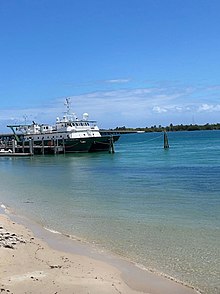
The University of Miami is classified among "Doctoral Universities: Very High Research Activity"[14] and ranks 67th among all U.S. universities in research and sponsored programs expenditures, which totaled $456 million in 2023.
In addition to research conducted in its individual academic schools and departments, the University of Miami maintains several university-wide research centers, including:
- Abess Center for Ecosystem Science and Policy seeks to bridge the gap between science and environmental policy.[169]
- Center for Research and Education for Aging and Technology Enhancement (CREATE) explores strategies to improve the quality of life for older adults.[170][171]
- Computational Science Center is a data center that conducts data-driven research to identify solutions to various world problems and challenges.[172]
- European Union Center, a designated European Union Center for Excellence, is a consortium between the University of Miami and Florida International University established in 2001 with a European Commission grant to promote and research economic, social, and political issues of interest to the European Union.[173]
- Institute for Cuban and Cuban-American Studies (ICCAS) provides academic and cultural research and insight on Cuba.[174]
- John P. Hussman Institute for Human Genomics researches causes of Parkinson's disease, Alzheimer's disease, macular degeneration, and other diseases and explores human genome and other possible cures and treatments for them.[100][175][176]
- The Sue and Leonard Miller Center for Contemporary Judaic Studies provides objective, in-depth exploration of issues and trends that have affected the Jewish people over the last century.
- The Wallace H. Coulter Center focuses on turning translational research in biomedical science and engineering into products that address unmet clinical needs and have market potential in the healthcare and biomedical industries.[177]
The University of Miami's Miller School of Medicine receives more than $200 million annually in external grants and contracts to fund 1,500 ongoing projects. The medical campus includes more than 500,000 sq ft (46,000 m2) of research space and the University of Miami's Life Science Park provides an additional 2,000,000 sq ft (190,000 m2) of space adjacent to the university's medical campus in Miami's Health District.[100] University of Miami's Interdisciplinary Stem Cell Institute researches the biology of stem cells and translates basic research into new regenerative therapies.
The University of Miami houses one of the nation's largest centralized academic cyberinfrastructures. In 2007, the university launched the Center for Computational Science High Performance Computing group. Since then, the group has grown from a zero HPC cyberinfrastructure to a regional high-performance computing environment that currently supports more than 1,200 users, 220 TFlops of computational power, and more than three petabytes of disk storage.[178]
As of 2008, the University of Miami's Rosenstiel School of Marine, Atmospheric, and Earth Science receives $50 million in annual external research funding.[179] Their laboratories include a saltwater wave tank, a five tank conditioning and spawning system, a multi-tank Aplysia culture laboratory, controlled corals climate tanks, and DNA profiling equipment.[180] The campus also houses an invertebrate museum with 400,000 specimens. The University of Miami operates the Bimini Biological Field Station in Bimini district in the western Bahamas, an array of oceanographic high-frequency radar along the East Coast of the United States, and a Bermuda-based aerosol observatory.[181] The university owns Little Salt Spring, a National Register of Historic Places site,[182] in North Port, Florida, where the Rosenstiel School performs archaeological and paleontological research.[183]
In 2010, the University of Miami built a brain imaging annex to the James M. Cox, Jr. Science Center within the College of Arts and Sciences, which includes a functional magnetic imaging (fMRI) system and a laboratory where scientists, clinicians, and engineers study fundamental aspects of brain function. Construction of the lab was funded in part by a $14.8 million stimulus grant from the National Institutes of Health (NIH).[184]
In 2016, the University of Miami received $195 million in federal research funding, including $131.3 million from the U.S. Department of Health and Human Services and $14.1 million from the National Science Foundation.[185] The University of Miami's Miller School of Medicine received a record $149.5 million in NIH funding in 2019, making the Miller School of Medicine the world's 39th-largest NIH grant recipient institution and largest NIH grant recipient of any medical school in Florida.[186]
Also in 2016, the university received $161 million in science and engineering funding from the U.S. federal government, making the university the largest Hispanic-serving recipient and 56th-largest recipient of federal science and engineering funding. Within the $161 million in funding, $117 million was granted by the U.S. Department of Health and Human Services to the university's school of medicine.[187]
Student life
[edit]
The University of Miami is affiliated with 31 social fraternities and sororities.[189] Seven of them have houses on campus: Alpha Epsilon Pi, Alpha Sigma Phi, Lambda Chi Alpha, Pi Kappa Phi, Sigma Alpha Epsilon, Sigma Chi, and Zeta Beta Tau. Others have suites, including: Beta Theta Pi, Tau Kappa Epsilon, Phi Delta Theta, and Sigma Phi Epsilon. Multicultural fraternities and sororities include six of the nine historically African-American organizations that are collectively known as the Divine Nine, Latino, and Asian-interest fraternities and sororities.[190]
As of 2022, the University of Miami has 356 student organizations,[191] including Amnesty International,[192] Habitat for Humanity,[193] the Ibis yearbook, UMTV (an award-winning cable television channel with nine programs broadcast on Comcast Channel 96),[194] UniMiami (a Spanish cable television broadcast),[195] the student-run Distraction Magazine, and the campus radio station WVUM, which has broadcast to the Miami metropolitan media market continuously since 1967.[196][197] Since 1929, students have published The Miami Hurricane, which is currently published weekly and has been named to the Associated Collegiate Press Hall of Fame.[198][199]
The University of Miami has several selective and prestigious student honor societies. Founded in 1926, Iron Arrow Honor Society, which also considers select faculty, staff, and alumni for induction, is the highest honor awarded by the university.[200][201] The university maintains a chapter of Mortar Board.[202] In 1959, Order of Omega was founded at the University of Miami and then ultimately blossomed into a national honor society in addition to maintaining its ongoing founding chapter at the University of Miami.[203] It is now a national honorary for fraternity and sorority members with its founding chapter continuing at the University of Miami.[204]
Athletics
[edit]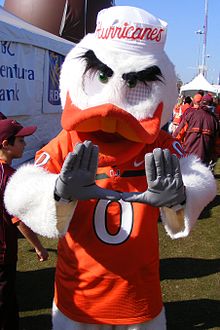
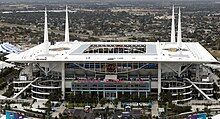
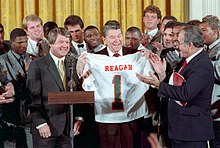
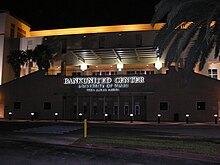
The University of Miami's athletic teams are the Miami Hurricanes and are widely referred to as "The 'Canes" or "The U". The Hurricanes are members of NCAA Division I, the highest level of athletics sanctioned by the National Collegiate Athletic Association (NCAA), and compete primarily in the Atlantic Coast Conference (ACC).[205] Prior to joining the ACC in 2004, the University of Miami competed in the Big East Conference. The Hurricanes maintain seven NCAA men's athletics teams (baseball, basketball, cross-country, diving, football, tennis, and track and field) and ten women's teams (basketball, cross-country, diving, golf, rowing, soccer, swimming, tennis, track and field, and volleyball).[16]
The University of Miami's mascot, first introduced in 1957, is Sebastian the Ibis. The university's 179-member marching band, established in 1933, is Band of the Hour.
Football
[edit]The University of Miami football team has won five national championships in 1983, 1987, 1989, 1991, and 2001[17] and has appeared in the AP Top 25 frequently since the 1980s. University of Miami football alumni include eleven members of the Pro Football Hall of Fame, two Heisman Trophy winners, and dozens of players who have gone on to NFL careers. As of 2024, at least one University of Miami football player has been selected in the NFL draft in 49 consecutive NFL drafts, dating back to 1975.[206] Among all colleges and universities, as of 2022, the University of Miami holds all-time records for most defensive linemen (49) and is tied with USC for most wide receivers (40) to go on to play at the NFL level.[207]
Beginning in the 1980s with the arrival of former head coach Howard Schnellenberger, the University of Miami football program blossomed quickly and unpredictably into one of the nation's most high profile and elite college football programs and began developing what now is one of the sport's largest and most passionate global fan bases. Since then, it also has developed several of the most famed, flamboyant, and successful players at the NFL level but also, along the way, been subjected to vast scrutiny and some criticism during its rise to national prominence, which featured three national championships in the 1980s followed by scandal-related damage to its recruiting capabilities, a subsequent comeback leading to its 2001 national championship, yet a second scandal-plagued descent, and, most recently, a second comeback that now has the program again recognized as a major force in national collegiate football.
Much of the program's dramatic history from the 1980s is captured in a widely viewed December 12, 2009, ESPN documentary, The U, which drew 2.3 million viewers, then making it the most watched documentary in ESPN history. A 2014 sequel, The U Part 2, picked up where The U left off, covering the University of Miami as it launched a comeback from these 1980s scandals leading up to its 2001 national championship team, widely considered one of the best, and possibly the best team, in college football history,[208] followed by yet a second series of widespread scandals that cost scholarships and inflicted multi-year damage on the program's competitiveness.[209]
The Hurricanes play their home games at Hard Rock Stadium in Miami Gardens.[210] In 2007, the university signed a 25-year contract for the team to play at Hard Rock Stadium through 2033.[211] Prior to moving to Hard Rock Stadium, from 1937 through 2007, the Hurricanes played their home football games at the Miami Orange Bowl in Little Havana.
Baseball
[edit]Like its football program, the University of Miami baseball team has proven one of the most successful in the nation over the past four decades, winning four national championships in 1982, 1985, 1999, and 2001. Multiple Miami Hurricanes baseball players have gone on to professional careers in Major League Baseball.[212][213][214]
The Hurricanes' baseball team plays their home games at Alex Rodriguez Park at Mark Light Field, an on-campus baseball stadium named for New York Yankees third baseman Alex Rodriguez, who contributed $3.9 million toward the stadium's renovation.[215]
Men's and women's basketball
[edit]The University of Miami's men's basketball team has reached the Sweet 16 of the NCAA Division I men's basketball tournament five times (1999–2000, 2012–2013, 2015–2016, 2021–2022, and 2022–2023), the Elite Eight twice (2021–2022 and 2022–2023), and the Final Four once (2022–2023).[216] Several Miami Hurricanes men's basketball players have gone on to play in the NBA.
In 2022–23, the University of Miami's women's basketball team reached the NCAA Elite Eight of the NCAA Division I women's basketball tournament for the first time in program history. Several of its players have gone on to play in the WNBA.
Both basketball teams play their home games at Watsco Center, an 8,000-capacity indoor stadium on the University of Miami campus.
Men's and women's tennis
[edit]The University of Miami's tennis program has produced several players who have gone on to amateur and professional accomplishment, including Israel team player Maya Tahan, Wimbledon Singles champion Rod Mandelstam, Pan American Games Doubles gold medal winner Ronni Reis, NCCA Women's Singles champion Audra Cohen, Wimbledon Doubles champion Doris Hart, three-time NCAA Singles champion Pancho Segura, and former professional tennis players Monique Albuquerque, Julia Cohen, Gardnar Mulloy, Ed Rubinoff, Michael Russell, Jodi Appelbaum-Steinbauer, and Todd Widom.
Other sports
[edit]The University of Miami women's soccer team and both its men's and women's track and field teams host their home meets in Cobb Stadium, which opened in 1999 on San Amaro Drive on the University of Miami campus.[217]
People
[edit]Notable alumni
[edit]Since its 1925 founding, several University of Miami alumni have gone on to globally-recognized accomplishment and influence in their respective fields. Among them are former Honduran president Porfirio Lobo Sosa, former Peruvian president Fernando Belaúnde, former Belize prime minister Dean Barrow, current Iceland prime minister Bjarni Benediktsson, economist and former Bahamas Central Bank governor Wendy Craigg, former Peruvian vice president and minister Mercedes Aráoz, Pulitzer Prize-winning poet and writing professor Donald Justice, actor Dwayne "The Rock" Johnson, Grammy Award-winning musicians Gloria Estefan, Bruce Hornsby, Enrique Iglesias, Jaco Pastorius, and Jon Secada, chief executive officers of various companies, public officials, heads of governmental agencies, scientists, academics, media personalities, authors and writers, and multiple professional athletes in Major League Baseball, the NBA, and the NFL, including eleven NFL Pro Football Hall of Fame inductees.
Notable faculty
[edit]University of Miami faculty include or have included a number of notable academics, including four Nobel Prize recipients and globally-recognized experts across nearly every academic discipline. Among them are physicist Paul Dirac, biochemists Robert F. Furchgott and Earl Wilbur Sutherland Jr., writers Paul Holdengräber and Juan Ramón Jiménez, former U.S. ambassador to the United Nations Peter Burleigh, sinologist Edward L. Dreyer, international affairs expert Leon Gouré, historians Mary Lindemann and Joan R. Piggott, economist Neil Wallace, finance and business management expert Henrik Cronqvist, former U.S. Secretary of Health and Services Donna Shalala, healthcare policy and management expert John Quelch, audio engineer Bill Porter, artist and architect Bonnie Seeman, architect Elizabeth Plater-Zyberk, sociologist Lowell Juilliard Carr, constitutional law expert John Hart Ely, administrative law expert Paul R. Verkuil, musicians Jaco Pastorius and Pat Metheny, artist Walter Darby Bannard, philosopher Colin McGinn, and others.
Notes
[edit]- ^ Other consists of Multiracial Americans and those who prefer not provide demographic information.
- ^ The percentage of students who received an income-based federal Pell Grant intended for low-income students.
- ^ The percentage of students whose income is at or exceeding that of the American middle class.
References
[edit]- ^ a b "Fast Facts", University of Miami, 2023-2024
- ^ NAICU Members Archived November 9, 2015, at the Wayback Machine
- ^ "University of Miami – Statements of Financial Position" (PDF). Retrieved February 28, 2024.
- ^ a b c d e f g h i j University of Miami. "Fast Facts | University of Miami". Retrieved February 28, 2024.
- ^ "Campuses of the University of Miami". Miami.edu. Archived from the original on August 9, 2015. Retrieved August 1, 2015.
- ^ "IPEDS-University of Miami". Archived from the original on November 7, 2021. Retrieved November 7, 2021.
- ^ "Colors – Web & Design". Archived from the original on October 22, 2022. Retrieved November 14, 2022.
- ^ McCoy, Jeffrey (January 14, 2007). "DefenseLink News Article: America Supports You: University of Miami 'Adopts' Sailors in Iraq". American Forces Press Service. US Department of Defense. Archived from the original on March 2, 2010. Retrieved April 26, 2007.
Maybe we'll see 'the U' in a BCS Bowl Game next year.
- ^ Lesmerises, Doug (September 2, 2009). "Ohio State football finding increasingly fertile recruiting ground in Florida". Cleveland Plain Dealer. Archived from the original on September 6, 2009. Retrieved September 8, 2009.
This was a generation that grew up rooting for Miami, the school known as 'The U,' which won 34 straight games from 2000–02.
- ^ "About UM", University of Miami website Archived February 21, 2022, at the Wayback Machine, retrieved February 21, 2022.
- ^ "Your UM Connection". University of Miami. Archived from the original on June 30, 2006. Retrieved November 13, 2009.
- ^ "Largest employers in South Florida" Archived February 13, 2023, at the Wayback Machine, South Florida Business Journal, September 24, 2021
- ^ "Fact Finder: 2023–24, University of Miami website, retrieved May 28, 2023
- ^ a b "Carnegie Classifications Institution Lookup". Carnegie Foundation for Advancement of Teaching. Retrieved May 27, 2022.
- ^ "Our Members". Association of American Universities. Retrieved June 1, 2023.
- ^ a b "Miami (Florida)". National Collegiate Athletic Association. Archived from the original on November 13, 2013. Retrieved February 7, 2010.
- ^ a b Jones, Robert C. Jr. (2007). "Born and Bred". Miami. Archived from the original on August 16, 2010. Retrieved October 17, 2009.
- ^ "Baseball History" Archived December 20, 2022, at the Wayback Machine, University of Miami baseball official website, retrieved December 20, 2022
- ^ "U Statue" Archived June 1, 2022, at the Wayback Machine, University of Miami website, retrieved May 18, 2022
- ^ Miami Herbert Business School Archived August 20, 2022, at the Wayback Machine at Academic Ranking of World Universities
- ^ a b c d "History". miami.edu. University of Miami. Archived from the original on February 18, 2010. Retrieved November 13, 2009.
- ^ Parks, Arva Moore (2006). George Merrick's Coral Gables: Where Your 'Castles in Spain' Are Made Real. Indianapolis: Centennial Press. p. 39. ISBN 0-9741589-6-8. Archived from the original on May 28, 2013. Retrieved December 4, 2010.
- ^ "A Guide to the George Merrick Papers". Historical Museum of Southern Florida. Archived from the original on July 17, 2011. Retrieved December 3, 2010.
- ^ Tebeau, Charlton W. (1976). The University of Miami. Coral Gables, FL: University of Miami Press. p. 19. ISBN 0-87024-297-0.
- ^ "History | Iron Arrow Honor Society | University of Miami". ironarrow.miami.edu. Archived from the original on July 7, 2018. Retrieved July 6, 2018.
- ^ a b c d e "About the Board". Board of Trustees. University of Miami. Archived from the original on December 3, 2019. Retrieved December 3, 2019.
- ^ a b Berlow, Grade (April 23, 1950). "10,000 University of Miami Students Attest to Growth of Sunshine School". Miami News. p. 44. Archived from the original on September 4, 2015. Retrieved February 7, 2010.
- ^ a b c d e f g h "Bold Beginnings Bright Tomorrows". Miami. Archived from the original on May 22, 2010. Retrieved October 25, 2009.
- ^ a b "University of Miami History – Chronology 1920s". UM Library. Archived from the original on October 8, 2009. Retrieved November 13, 2009.
- ^ "Cardboard College No More". The Miami News. February 28, 1968. p. 18A. Archived from the original on September 4, 2015. Retrieved February 5, 2010.
- ^ "Receiver for U. of Miami.; Federal Judge Names Board Member to Handle Affairs". The New York Times. December 11, 1932. p. 30. Archived from the original on July 1, 2018.
- ^ "13 Law Students Will Get Degrees". Miami News. June 2, 1929. p. 8. Archived from the original on September 4, 2015. Retrieved February 7, 2010.
- ^ "World War II". Coral Gables, Florida: University of Miami. 2011. Archived from the original on September 2, 2006. Retrieved September 29, 2011.
- ^ a b "Dr. J.F.W. Pearson Named President of Miami University". Sarasota Herald-Tribune. January 13, 1953. p. 3. Archived from the original on September 4, 2015. Retrieved February 8, 2010.
- ^ a b "Education: Growing Up in Miami – TIME". Time. June 23, 1961. Archived from the original on February 4, 2011. Retrieved September 8, 2009.
- ^ Bohning, Don (2005). The Castro Obsession: U.S. Covert Operations in Cuba, 1959–1965. Potomac Books Inc. p. 79. ISBN 978-1-57488-675-7.
- ^ "The University of Miami Drops Its Color Barrier". The New York Times. February 1, 1961. p. 33. Archived from the original on July 22, 2018. Retrieved February 5, 2010.
- ^ "Miami Football History – Miami Official Athletic Site". UM Sports Information. Archived from the original on May 12, 2006. Retrieved October 13, 2009.
- ^ Wolff, Alexander (November 2, 2005). "Breaking down barriers How two people helped change face of college football". Sports Illustrated. Archived from the original on December 24, 2010. Retrieved February 1, 2010.
- ^ Women's Commission Dissertation (PDF). University of Miami. p. 12. Archived from the original (PDF) on September 30, 2004. Retrieved October 10, 2009.
- ^ Women's Commission Dissertation (PDF). University of Miami. p. 1. Archived from the original (PDF) on September 30, 2004. Retrieved October 10, 2009.
- ^ "Commencement History and Traditions". University of Miami. Archived from the original on June 27, 2010. Retrieved February 6, 2010.
- ^ Women's Commission Dissertation (PDF). University of Miami. pp. 21–30. Archived from the original (PDF) on September 30, 2004. Retrieved November 16, 2009.
- ^ "UM Milestones". University of Miami News and Events. January 30, 2016. Archived from the original on January 31, 2016. Retrieved February 1, 2016.
- ^ Baggs, Bill (April 17, 1962). "The 3rd President". Miami News. p. 10A. Retrieved February 7, 2010.[dead link]
- ^ Thames, Rick (June 24, 1981). "It's first day on job for U-M's new president". Miami News. p. 1A. Retrieved February 10, 2010.[dead link]
- ^ Mell, Randall (October 17, 1990). "UM to Eliminate Its Athletic Dorms". Sun Sentinel. p. 1C. Archived from the original on June 4, 2011. Retrieved February 10, 2010.
Next fall, incoming freshman athletes will draw for residential college rooms
- ^ "Foote Notes". February 17, 2012. Archived from the original on February 17, 2012. Retrieved May 13, 2023.
{{cite web}}: CS1 maint: bot: original URL status unknown (link) - ^ "Foote Notes". Miami. No. Spring 2001. Archived from the original on February 17, 2012. Retrieved October 11, 2009.
- ^ "Shalala Is to Lead University of Miami". The New York Times. November 19, 2000. Archived from the original on May 23, 2013. Retrieved February 5, 2010.
- ^ Dahlburg, John-Thor (January 3, 2003). "'Suntan U' Tries to Shed Cushy Image – Los Angeles Times". Los Angeles Times. Archived from the original on October 18, 2012. Retrieved September 8, 2009.
- ^ "Florida's Law on Hazing: The Chad Meredith Act", Florida State University, The Miami Hurricane, archived from the original on April 10, 2017, retrieved December 5, 2017
- ^ ""A pledge drowns: $12.6 million verdict", Fraternal Law, March 2004". Archived from the original on June 1, 2022. Retrieved May 22, 2022.
- ^ "University of Miami Campaign Overview – Research". University of Miami. Archived from the original on March 6, 2010. Retrieved October 9, 2009.
- ^ a b "University of Miami Campaign Overview – Progress". University of Miami. Archived from the original on July 6, 2008. Retrieved October 9, 2009.
- ^ Corral, Oscar (February 9, 2008). "UM fundraising drive brings in $1.4 billion". Miami Herald. p. A1.
- ^ "Prized Hospital Joins UM Tradition of Excellence". Medicine, the alumni magazine. University of Miami. Spring 2008. Archived from the original on March 29, 2012. Retrieved October 9, 2009.
- ^ The Associated Press (April 10, 2003). "Academics fired at U. of Miami think tank". Sarasota Herald Tribune. Archived from the original on February 17, 2018. Retrieved February 16, 2018.
- ^ "CPD: 2004 Debates". Commission on Presidential Debates. Archived from the original on June 11, 2008. Retrieved October 6, 2009.
- ^ Bell, Maya (June 16, 2006). "UM janitors vote to unionize". Sun Sentinel Miami News. Archived from the original on June 19, 2006. Retrieved February 1, 2010.
- ^ Menèndez, Ana (April 26, 2006). "At UM Tent City Among The Trees, Hope Resounds". Miami Herald. p. B1. Archived from the original on May 17, 2006.
- ^ "The Janitor's Fight". Miami Herald. April 27, 2006. p. 30A. Archived from the original on May 22, 2006.
- ^ Greenhouse, Steven (May 2, 2006). "Walkout Ends at University of Miami as Janitors' Pact Is Reached". The New York Times. Archived from the original on December 9, 2013. Retrieved February 5, 2010.
- ^ a b Shalala, Donna (March 5, 2009). "Letter to Alumni". University of Miami. Archived from the original on October 31, 2009. Retrieved October 26, 2009.
- ^ "NACUBO Endowment Study" (PDF). National Association of College and University Business Officers. p. 3. Archived from the original (PDF) on December 14, 2017. Retrieved September 9, 2009.
- ^ "Worth | Worth". Worth. Archived from the original on November 13, 2013. Retrieved February 14, 2011.
- ^ [1] Archived April 16, 2015, at the Wayback Machine
- ^ "Republican Debate in Miami: What to Watch". CNN.com. March 10, 2016. Archived from the original on December 4, 2020. Retrieved August 9, 2022.
- ^ "Dr. Julio Frenk named first Latino chancellor of UCLA", University of California, June 12, 2024
- ^ University of Miami letter from Manny Kadre, chairman, University of Miami board of trustees, June 12, 2024
- ^ "Frenk's choice to leave UM before the centennial is shocking", The Miami Hurricane, June 19, 2024
- ^ "2015 best colleges rankings", U.S. News & World Report
- ^ [https://www.usnews.com/best-colleges/rankings/national-universities "2024 Best National Universities", U.S. News & World Report
- ^ "Face Book: 2021–2022" (PDF). University of Miami. Retrieved May 26, 2022.
- ^ "Real Estate & Facilities | University of Miami". University of Miami. Archived from the original on May 21, 2009. Retrieved September 10, 2009.
- ^ "Jerry Herman Ring Theatre, U of M". Miami Sun Sentinel. Archived from the original on July 14, 2012. Retrieved February 5, 2010.
- ^ "Parks & Recreation Amenities". City of Coral Gables. Archived from the original on June 15, 2006. Retrieved February 5, 2010.
- ^ "Cultural Programming". University of Miami. Archived from the original on September 6, 2006. Retrieved January 13, 2010.
- ^ "A New Sensibility". Traditional Building. April 2006. Archived from the original on July 19, 2011. Retrieved February 5, 2010.
- ^ "Miami-Dade County – Transit". Miami Dade County. Archived from the original on July 9, 2009. Retrieved February 17, 2010.
- ^ "Metrorail schedule" (PDF). Miami Dade County. Archived from the original (PDF) on April 20, 2009. Retrieved February 17, 2010.
- ^ "University of Miami becomes star of new Drake video" Archived April 28, 2019, at the Wayback Machine, SI News, February 19, 2018, retrieved April 28, 2019.
- ^ "God's Plan" video by Drake Archived July 21, 2017, at the Wayback Machine, retrieved April 28, 2019.
- ^ "UM Housing". UM Department of Residence Halls. Archived from the original on January 24, 2008. Retrieved February 26, 2008.
- ^ a b "A Brief History". University of Miami. Archived from the original on May 26, 2022. Retrieved May 25, 2022.
- ^ "Hecht Residential College | University of Miami". University of Miami. Archived from the original on April 20, 2009. Retrieved February 12, 2010.
- ^ "Stanford Residential College | University of Miami". University of Miami. Archived from the original on April 21, 2009. Retrieved February 12, 2010.
- ^ "Eaton Residential College | University of Miami". University of Miami. Archived from the original on April 22, 2009. Retrieved February 12, 2010.
- ^ "Mahoney Residential College | University of Miami". University of Miami. Archived from the original on March 21, 2009. Retrieved February 12, 2010.
- ^ "Pearson Residential College | University of Miami". University of Miami. Archived from the original on April 23, 2009. Retrieved February 12, 2010.
- ^ "University Village | University of Miami". University of Miami. Archived from the original on December 13, 2009. Retrieved February 12, 2010.
- ^ "Graduate / Law / Medical | University of Miami". University of Miami. Archived from the original on October 12, 2007. Retrieved February 13, 2010.
- ^ "Housing Information for RSMAS Students". Rosenstiel School of Marine, Atmospheric, and Earth Science. Archived from the original on August 5, 2009. Retrieved February 13, 2010.
- ^ "Lakeside Village". newstudenthousing.studentaffairs.miami.edu. Archived from the original on August 3, 2019. Retrieved August 3, 2019.
- ^ "100 of the largest hospitals and health systems in America" Archived June 2, 2022, at the Wayback Machine, Becker's Hospital Review, July 2010
- ^ a b c "Campus Webcam Tour". University of Miami. Archived from the original on August 28, 2006. Retrieved February 15, 2010.
- ^ a b "Campuses and Facilities". University of Miami. Archived from the original on November 6, 2009. Retrieved November 13, 2009.
- ^ Dade County listings Archived November 10, 2009, at the Wayback Machine at National Register of Historic Places Archived February 10, 2010, at the Wayback Machine U.S. Dept. of Interior. Retrieved February 16, 2010.
- ^ "University Journal". Miami. Archived from the original on August 16, 2010. Retrieved September 7, 2009.
- ^ a b c "Facts, Figures, Accolades, and Accomplishments". University of Miami. Archived from the original on April 17, 2009. Retrieved November 16, 2009.
- ^ "Medical Campus". University of Miami. Archived from the original on November 6, 2009. Retrieved October 9, 2009.
- ^ "UM Opens Its Life Science & Technology Park | Miller School of Medicine | University of Miami". med.miami.edu. Archived from the original on January 9, 2019. Retrieved January 8, 2019.
- ^ "The Reference Desk". UnderwaterTimes.com. Archived from the original on January 13, 2010. Retrieved February 18, 2010.
- ^ "University Roundup: Rosentstiel School of Marine and Atmospheric Science at the University of Miami". Marine Science Today. Archived from the original on August 20, 2011. Retrieved April 16, 2011.
- ^ Rosentiel School Barbados Atmospheric Chemistry Observatory (BACO), retrieved March 1, 2024
- ^ a b c "History". University of Miami. Archived from the original on November 14, 2009. Retrieved November 21, 2009.
- ^ Bandell, Brian (July 20, 2009). "UM marine science school awarded $15M in stimulus". South Florida Business Journal. Archived from the original on July 24, 2009. Retrieved February 7, 2010.
- ^ a b "Display Selected University of Miami Legacy Images". University of Miami. Archived from the original on September 2, 2006. Retrieved September 7, 2009.
- ^ "$400,000 Tab for Environmental Violations". Inside Higher Education. August 25, 2006. Archived from the original on March 1, 2007. Retrieved November 21, 2009.
- ^ "Phonebook | University of Miami". University of Miami. Archived from the original on July 25, 2010. Retrieved September 7, 2009.
- ^ Eric Kalis (July 9, 2014). "Developer buys land from University of Miami". The Real Deal. Archived from the original on January 2, 2016. Retrieved August 31, 2016.
- ^ "University of Miami" (PDF). University of Miami. Archived from the original (PDF) on March 7, 2004. Retrieved November 21, 2009.
- ^ "Libraries: Facts & Figures". University of Miami Libraries. University of Miami. 2011. Archived from the original on February 16, 2017. Retrieved February 15, 2017.https://www.library.miami.edu/about/facts.html
- ^ "Institutional Research and Strategic Analytics", Archived June 9, 2021, at the Wayback Machine University of Miami website, retrieved May 28, 2022
- ^ "About the University of Miami Libraries" Archived May 26, 2022, at the Wayback Machine, University of Miami website
- ^ "Otto G. Richter Library". librarytechnology.org. Archived from the original on October 21, 2011. Retrieved February 1, 2010.
- ^ "Unlocking the vaults: The Cuban Heritage Collection", Miami.edu
- ^ Veciana-Suarez, Ana (January 22, 2017). "This college donation is truly historic. And it's not just the artifacts involved". Miami Herald. Archived from the original on February 23, 2017. Retrieved February 22, 2017.
- ^ "Faculty and Employees – Fall 2018 – University of Miami". University of Miami. Archived from the original on June 13, 2018. Retrieved December 25, 2018.
- ^ University of Miami factbook Archived June 1, 2022, at the Wayback Machine at University of Miami official website
- ^ "Miami Herbert Business School earns AMBA accreditation and 'triple crown' status" Archived October 27, 2022, at the Wayback Machine, Miami Herbert Business School press release, September 23, 2022, retrieved October 27, 2022
- ^ "Fact Book" (PDF). University of Miami. Retrieved February 3, 2024.
- ^ a b "Common Data Set 2022-23" (PDF). University of Miami. Archived (PDF) from the original on August 8, 2023. Retrieved October 7, 2023.
- ^ a b "Common Data Set 2021-22" (PDF). University of Miami. Archived (PDF) from the original on June 1, 2023. Retrieved October 7, 2023.
- ^ a b "Common Data Set 2020-21" (PDF). University of Miami. Archived (PDF) from the original on June 1, 2023. Retrieved October 7, 2023.
- ^ a b "Common Data Set 2019-20" (PDF). University of Miami. Archived (PDF) from the original on February 7, 2023. Retrieved October 7, 2023.
- ^ a b "Common Data Set 2018-19" (PDF). University of Miami. Archived (PDF) from the original on February 7, 2023. Retrieved October 7, 2023.
- ^ University of Miami Archived July 11, 2022, at the Wayback Machine at Niche
- ^ "University of Miami Fact Book". irsa.miami.edu. University of Miami. January 29, 2024. Archived (PDF) from the original on March 21, 2023. Retrieved January 29, 2024.
- ^ "First-Year Admitted Student Profile". University of Miami – Undergraduate Admissions. Archived from the original on July 19, 2022. Retrieved July 18, 2022.
- ^ "Admissions Statistics" (PDF). University of Miami. Archived from the original (PDF) on August 12, 2016. Retrieved July 8, 2016.
- ^ "2020–2021 Common Data Set" (PDF). University of Miami. Archived from the original (PDF) on February 3, 2020. Retrieved May 29, 2021.
- ^ "University of Miami Common Data Set 2023–2024" (PDF). irsa.miami.edu. University of Miami. January 5, 2024. Archived (PDF) from the original on February 4, 2024. Retrieved February 3, 2024.
- ^ "University of Miami Common Data Set 2023–2024" (PDF). University of Miami. Retrieved February 3, 2024.
- ^ "Student Enrollment". Archived from the original on December 19, 2019. Retrieved January 8, 2020.
- ^ "U Miami Student Population Stats". CollegeFactual. Archived from the original on September 18, 2020. Retrieved November 23, 2020.
- ^ "University of Miami Common Data Set 2022–2023" (PDF). irsa.miami.edu. University of Miami. May 22, 2023. Archived (PDF) from the original on March 21, 2023. Retrieved June 2, 2023.
- ^ "Student Consumer Information—Graduation Rates". University of Miami. Archived from the original on July 6, 2019. Retrieved February 18, 2019.
- ^ "University of Miami (Florida) Cohort Graduation Rates" (PDF). National Collegiate Athletics Association. p. 1. Archived from the original (PDF) on June 15, 2013. Retrieved February 8, 2018.
- ^ "Graduation Success Rate Report" (PDF). National Collegiate Athletics Association. Archived from the original (PDF) on August 17, 2018. Retrieved February 7, 2018.
- ^ "Common Data Set 2017-18" (PDF). University of Miami. Archived (PDF) from the original on February 7, 2023. Retrieved October 7, 2023.
- ^ Dhiraj, Amarendra (December 11, 2017). "America's Top 50 Highest Paid Private University Presidents". CEOWORLD magazine. Archived from the original on August 1, 2018. Retrieved July 15, 2018.
- ^ "The Graduate School | University of Miami". University of Miami. Archived from the original on April 17, 2010. Retrieved February 9, 2010.
- ^ "FIU/UM Doctoral Exchange Program". Florida International University. Archived from the original on February 16, 2010. Retrieved February 2, 2010.
- ^ "Canes Angel Network – U innovation". The Launch Pad. October 9, 2019. Archived from the original on September 23, 2020. Retrieved May 7, 2020.
- ^ "Startup Practicum | University of Miami School of Law". www.law.miami.edu. Archived from the original on March 28, 2020. Retrieved May 7, 2020.
- ^ "Students Gain Business Law Experience Helping Startups as Part of 'Cane Angel Network Investment Group | University of Miami School of Law". www.law.miami.edu. Archived from the original on May 6, 2020. Retrieved May 7, 2020.
- ^ "College Scorecard: University of Miami". United States Department of Education. Archived from the original on May 24, 2022. Retrieved May 8, 2022.
- ^ "ABOUT THE GRADUATE PROGRAM IN BIOMEDICAL SCIENCES". University of Miami. Archived from the original on March 7, 2010. Retrieved February 13, 2010.
- ^ "MD/PhD Program – Graduate". University of Miami. Archived from the original on December 17, 2004. Retrieved February 13, 2010.
- ^ "Annual Student Costs". University of Miami. Archived from the original on January 29, 2017. Retrieved June 30, 2018.
- ^ "Cost of attendance" Archived June 20, 2022, at the Wayback Machine University of Miami official website
- ^ University of Miami profile Archived April 22, 2022, at the Wayback Machine at U.S. News & World Report National Universities
- ^ "USNews.com: Graduate School: University of Miami (Law): At a glance". U.S. News & World Report. Archived from the original on March 20, 2017. Retrieved May 29, 2021.
- ^ "Oceanography" Archived August 23, 2022, at the Wayback Machine at 2022 Shanghai Ranking
- ^ "Business Administration" Archived August 20, 2022, at the Wayback Machine at 2022 Shanghai Ranking
- ^ "USNews.com". U.S. News & World Report. Archived from the original on February 5, 2020. Retrieved July 21, 2018.
- ^ "Best Clinical Psychology Programs". U.S. News & World Report. 2008. Archived from the original on February 25, 2011. Retrieved March 28, 2011.
- ^ "America's Top Colleges 2024". Forbes. September 6, 2024. Retrieved September 10, 2024.
- ^ "2024-2025 Best National Universities Rankings". U.S. News & World Report. September 23, 2024. Retrieved November 22, 2024.
- ^ "2024 National University Rankings". Washington Monthly. August 25, 2024. Retrieved August 29, 2024.
- ^ "2025 Best Colleges in the U.S." The Wall Street Journal/College Pulse. September 4, 2024. Retrieved September 6, 2024.
- ^ "2024 Academic Ranking of World Universities". ShanghaiRanking Consultancy. August 15, 2024. Retrieved August 21, 2024.
- ^ "QS World University Rankings 2025". Quacquarelli Symonds. June 4, 2024. Retrieved August 9, 2024.
- ^ "World University Rankings 2024". Times Higher Education. September 27, 2023. Retrieved August 9, 2024.
- ^ "2024-2025 Best Global Universities Rankings". U.S. News & World Report. June 24, 2024. Retrieved August 9, 2024.
- ^ "University of Miami – U.S. News Best Grad School Rankings". U.S. News & World Report. Archived from the original on October 25, 2020. Retrieved September 1, 2020.
- ^ "University of Miami – U.S. News Best Global University Rankings". U.S. News & World Report. Archived from the original on October 25, 2020. Retrieved September 1, 2020.
- ^ "Leonard and Jayne Abess endow Ecosystem Science and Policy Center with a $5 million gift". University of Miami. October 26, 2006. Archived from the original on July 19, 2010. Retrieved October 9, 2009.
- ^ "Silver Meets Silicon | New Knowledge | University of Miami". University of Miami. Archived from the original on October 19, 2009. Retrieved September 18, 2009.
- ^ "UM Researcher Receives $9 Million NIH Grant". University of Miami. November 10, 2009. Archived from the original on May 27, 2010. Retrieved February 9, 2010.
- ^ "Computational Science Center to boost faculty research". September 2008. Archived from the original on April 14, 2015. Retrieved April 7, 2015.
- ^ Stepp, Holly (September 21, 2001). "Florida universities team up with European Union to start think tank". Knight Ridder/Tribune News Service. Archived from the original on January 22, 2012. Retrieved February 8, 2010.
- ^ "Ex-commerce secretary Carlos Gutierrez takes Miami university post". New York Daily News. February 20, 2009. Archived from the original on December 24, 2010. Retrieved February 6, 2010.
- ^ "Centers and Institutes". University of Miami. Archived from the original on October 15, 2009. Retrieved September 9, 2009.
- ^ "Miami Institute for Human Genomics Receives $2M Gift for Research | News Releases | University of Miami". University of Miami. Archived from the original on September 7, 2009. Retrieved September 7, 2009.
- ^ "UM Innovation Coulter Center". University of Miami. Archived from the original on June 10, 2010. Retrieved October 15, 2009.
- ^ "Pegasus Supercomputer". Archived from the original on July 20, 2018. Retrieved July 6, 2018.
- ^ "2008 Rosenstiel Annual Report" (PDF). University of Miami. p. 30. Archived from the original (PDF) on May 29, 2009. Retrieved November 21, 2009.
- ^ "Rosenstiel School: Facilities". University of Miami. Archived from the original on August 30, 2009. Retrieved February 9, 2010.
- ^ "Rosenstiel School Facilities". University of Miami. Archived from the original on August 30, 2009. Retrieved November 21, 2009.
- ^ "Dial Hotline". Sarasota Herald Tribune. November 24, 1980. p. 54. Archived from the original on September 4, 2015. Retrieved February 6, 2010.
- ^ "Little Salt Spring Reveals More Florida History". University of Miami. July 6, 2005. Archived from the original on September 22, 2006. Retrieved November 16, 2009.
- ^ Yanez, Luisa (February 5, 2010). "University of Miami gets $14.8M to build brain imaging annex". Miami Herald. Retrieved February 5, 2010.[permanent dead link]
- ^ "Academic Institutional Profiles – University of Miami". Archived from the original on August 3, 2018. Retrieved July 28, 2018.
- ^ Benchley, Robert (June 17, 2020). "Miller School's NIH Research Funding Sets Record". Miller School of Medicine. Retrieved January 20, 2024.
- ^ "Federal obligations for science and engineering, by agency: 2016–07". National Science Foundation. Archived from the original on August 3, 2018. Retrieved July 6, 2018.
- ^ "Arrow Heads", Miami, Fall 2000
- ^ "Greek Life | University of Miami". University of Miami. Archived from the original on August 23, 2009. Retrieved September 7, 2009.
- ^ "FAQ's For Parents | University of Miami". University of Miami. Archived from the original on May 27, 2010. Retrieved February 12, 2010.
- ^ "Student Affairs" Archived May 4, 2022, at the Wayback Machine at miami.edu, retrieved May 1, 2022,
- ^ "Amnesty International – University of Miami". Amnesty International USA. Archived from the original on July 16, 2011. Retrieved February 7, 2010.
- ^ "UMTV". UM School of Communications. Archived from the original on June 9, 2010. Retrieved February 7, 2010.
- ^ UMTV Archived May 2, 2022, at the Wayback Machine official website, retrieved May 1, 2022
- ^ UniMiami Archived May 2, 2022, at the Wayback Machine official website, retrieved May 1, 2022
- ^ "WVUM (90.5FM), University of Miami student radio station". WVUM. Archived from the original on April 12, 2010. Retrieved January 13, 2010.
- ^ "Student Organizations". University of Miami. Archived from the original on August 6, 2009. Retrieved September 7, 2009.
- ^ "The Miami Hurricane". The Miami Hurricane. Archived from the original on January 16, 2010. Retrieved February 7, 2010.
- ^ "ACP Hall of Fame". Associated Collegiate Press. Archived from the original on February 20, 1999. Retrieved February 7, 2010.
- ^ "Arrowheads" Miami, Fall 2000. Archived November 20, 2009, at the Wayback Machine
- ^ "Iron Arrow Society at the University of Miami". Iron Arrow Society. Archived from the original on January 9, 2010. Retrieved February 7, 2010.
- ^ "Chapter List". Mortar Board National Collegiate Honorary Society. Archived from the original on April 29, 2007. Retrieved February 7, 2010.
- ^ "History and Purpose". Order of Omega. Archived from the original on August 8, 2009. Retrieved February 5, 2010.
- ^ "Chapter list". Order of Omega. Archived from the original on August 8, 2009. Retrieved February 5, 2010.
- ^ "This is the A.C.C." Atlantic Coast Conference. Archived from the original on April 23, 2006. Retrieved February 5, 2010.
- ^ "Miami mountain man DT Jon Ford drafted by Packers in seventh round, preserves 48-year streak", The Miami Herald, April 30, 2022
- ^ "Colleges with most NFL draft picks by position" Archived April 30, 2022, at the Wayback Machine, NFL.com, retrieved April 30, 2022
- ^ ""The 2001 Miami Hurricanes are one of college football's greatest teams ever," ESPN, November 18, 2021". November 18, 2021. Archived from the original on September 23, 2022. Retrieved September 23, 2022.
- ^ Levine, Stuart (December 16, 2009). "'The U' sets docu record at ESPN". Variety. Archived from the original on December 27, 2009. Retrieved January 26, 2013.
- ^ "Hard Rock Paying $250 Million For Miami Dolphins Stadium Naming Rights". Forbes. August 17, 2016. Archived from the original on August 25, 2016. Retrieved August 24, 2016.
- ^ "Future of Orange Bowl in doubt Future of Orange Bowl in doubt". BBC Sport. August 21, 2007. Archived from the original on November 12, 2012. Retrieved November 13, 2009.
- ^ "Ryan Braun profile" Archived March 11, 2007, at the Wayback Machine, Miami Hurricanes. Retrieved February 20, 2007.
- ^ Wechsler, Robert, Day by Day in Jewish Sports History Archived October 16, 2015, at the Wayback Machine, p. 144, Ktav Publishing House, 2007, ISBN 0881259691, accessed June 1, 2009
- ^ "Scheinbaum Named All-American". Unlvrebels.com. August 1, 2003. Archived from the original on March 30, 2012. Retrieved September 13, 2011.
- ^ "Alex Rodriguez Park Dedication Feb .13". rivals.com. Rivals.com. January 28, 2009. Archived from the original on February 18, 2009. Retrieved February 7, 2010.
- ^ Zavala, Steve (March 25, 2023). "Jim Larranaga Delivers Honest Take on Whether Miami is Now a 'Basketball School'". ClutchPoints. Archived from the original on April 26, 2023. Retrieved April 26, 2023.
- ^ "Cobb Stadium". University of Miami. Archived from the original on February 20, 2010. Retrieved March 4, 2010.
External links
[edit]
- University of Miami
- 1925 establishments in Florida
- Coral Gables, Florida
- Education in Miami
- Private universities and colleges in Florida
- Universities and colleges accredited by the Southern Association of Colleges and Schools
- Universities and colleges established in 1925
- Universities and colleges in Miami-Dade County, Florida


